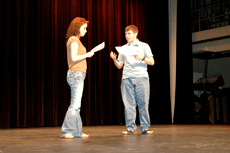Art imitates life. Sometimes, though, the reverse happens. Students will become familiar with the phrase “common cultural experience” this semester. The experience: immersion into an ancient Greek play, “Oedipus the King.”
A student engagement committee for the University concluded that encouraging faculty to apply the play to their lessons would help build intellectual communities on campus, Robert Alexander, chair of the committee, says.
The student engagement committee is a sub-committee of Nicholls’ Quality Enhancement Plan, known as “L’esprit engage” or “The Engaged Mind.”
Alexander says the committee wanted a theme that would continue throughout the semester. The committee decided that using “Oedipus the King,” which had already been selected as the Nicholls Players’ production this semester, could increase play attendance and create a spark of interest in Greek culture across campus.
But the student engagement committee did not intend for the common cultural experience to only be applied to English and drama classes, Alexander says. Faculty in all areas are encouraged, but not mandated, to find creative ways to bring the play into their classrooms.
“[Oedipus the King] is an appropriate choice because it opens up many possibilities for discussion across disciplinary boundaries,” Alexander says.
The study of alchemy in chemistry classes. The creation of Greek dishes in culinary classes. Discussion about ancient Greek government in political science classes. In addition to promoting these types of classroom scenarios, Alexander says throughout the semester the student engagement committee may facilitate forums and present films relating to the play.
College education isn’t confined to the classroom, Alexander says. Attending cultural events, concerts and plays and viewing art exhibits, in addition to watching sports events are all part of identifying with the University, he says.
“This kind of an experience is an important part of the higher education experience and environment,” Alexander says.
Although the play is ancient, Stanley Coleman, assistant speech professor and advisor to the Nicholls Players, says the translation that will be used for the performances of “Oedipus the King” will be more reader-friendly than other archaic versions.
The usage of “Oedipus the King” for the common cultural experience should help increase play attendance, Coleman says.
“People who are familiar with the culture they’re watching will have a better understanding of the play and will enjoy it more,” he says.
Coleman says he chose “Oedipus the King” because it is one of the greatest plays and is considered to be the finest of the tragedies written for the stage. He says the play offers a look into Greek culture, the values they cherished [such as truth and beauty] and Greek religion.
Despite its age, Alexander says the play is incredibly interesting. A theme of the play, referred to as the Oedipal complex, conveys that the young boy envies his father and wishes to replace him in order to be with the boy’s mother.
“We’re talking about these bizarre familial relationships and incest, which is on some level like Jerry Springer, so there’s a natural interest in that,” Alexander says. “This play will get you to think and should create some interesting discussion.”
Another element exposed in “Oedipus the King” is the Greeks’ strong belief in destiny. Alexander says people often use clichs to express their beliefs about fate and free will instead of thinking deeply about them.
“These are things at the heart of what it means to be human – understanding how much free will we can exercise or if we’re just puppets in the hands of a cosmic puppet master – whether you think of that as God or fate or destiny,” Alexander says.
As for the future of the common cultural experience, Alexander says the student engagement committee may decide to take a different direction next semester. Interaction with student focus groups to evaluate the program at the end of the semester is being considered, he says.
Life can imitate art. Even if the art dates to more than 2,000 years ago, some values and conceptss continue to intrigue the world.








